(新课标)Unit 5 Do you have a soccer ball Section A (Grammar Focus-3c) 课件
文档属性
| 名称 | (新课标)Unit 5 Do you have a soccer ball Section A (Grammar Focus-3c) 课件 | 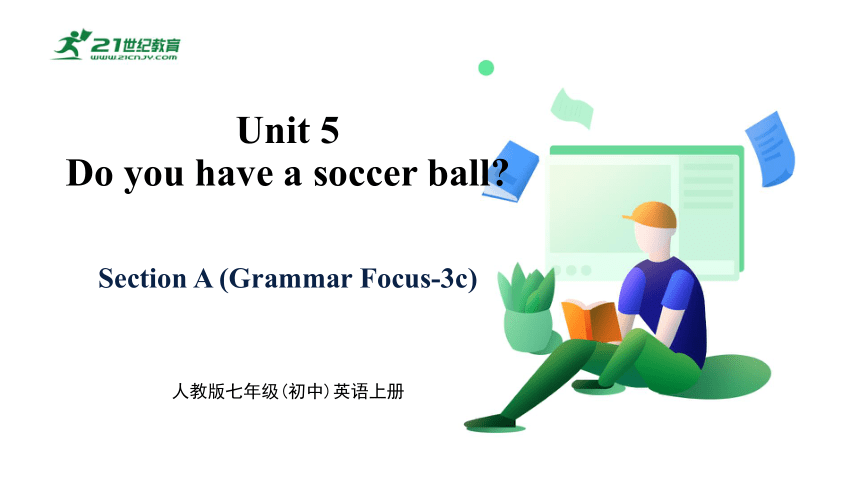 | |
| 格式 | zip | ||
| 文件大小 | 2.3MB | ||
| 资源类型 | 试卷 | ||
| 版本资源 | 人教新目标(Go for it)版 | ||
| 科目 | 英语 | ||
| 更新时间 | 2022-08-23 14:42:44 | ||
图片预览

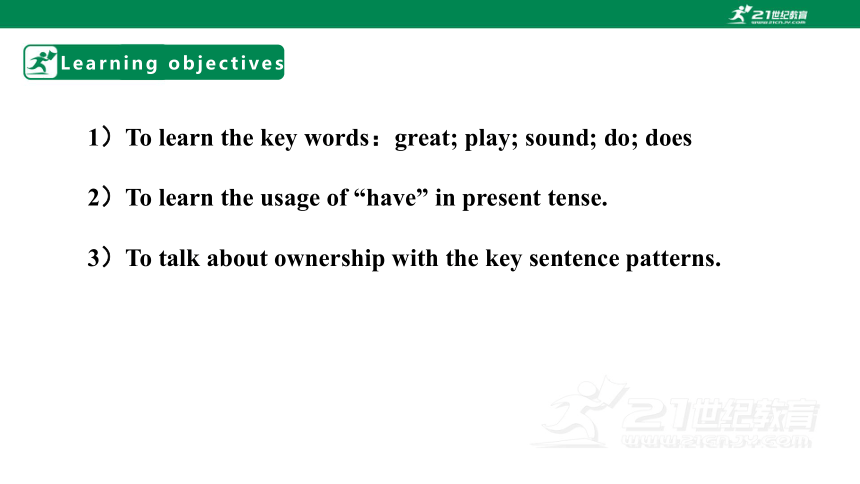
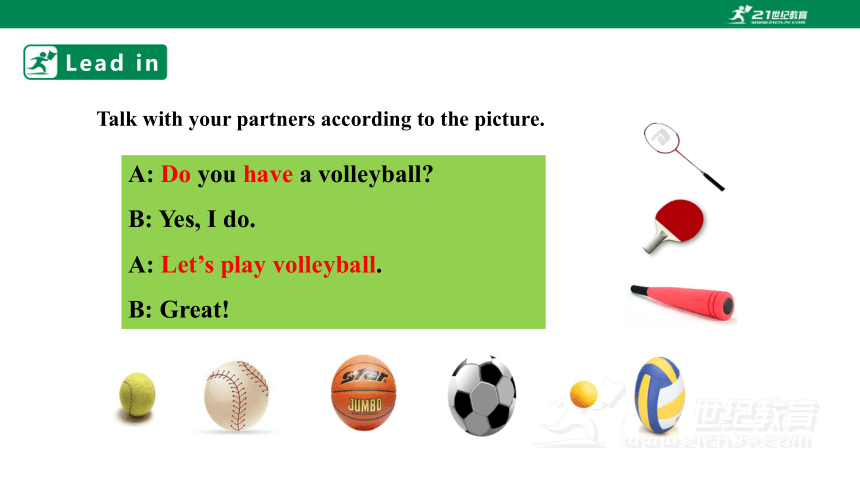
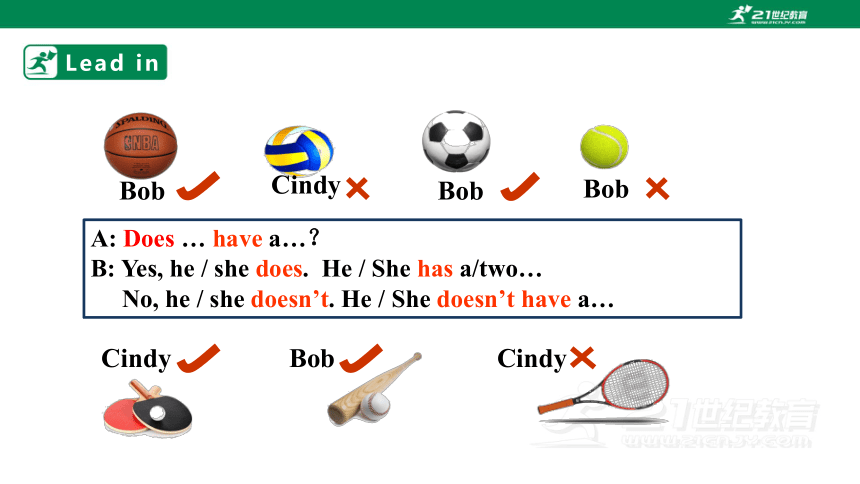
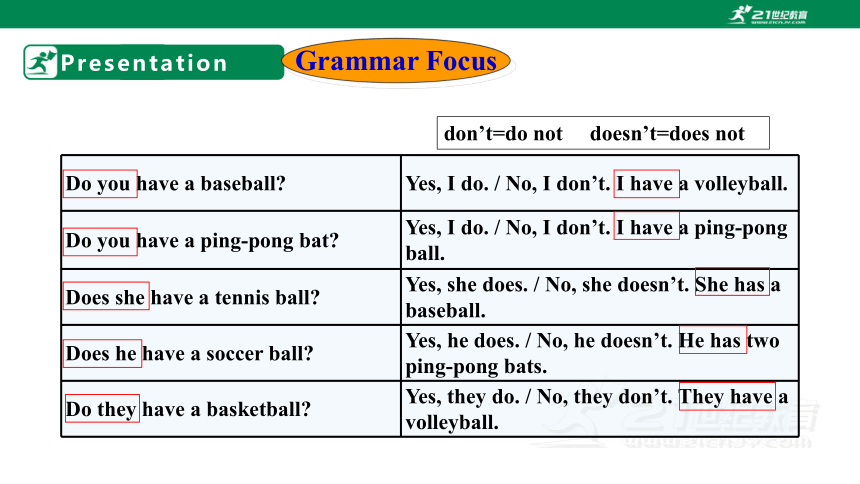

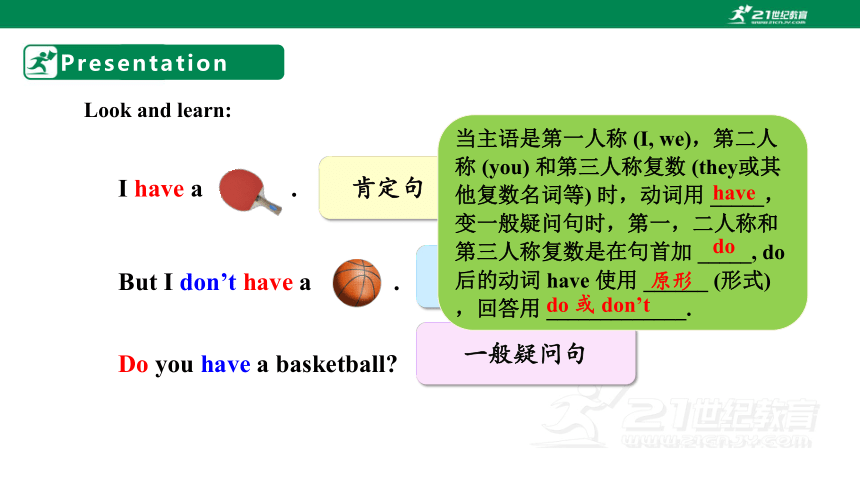
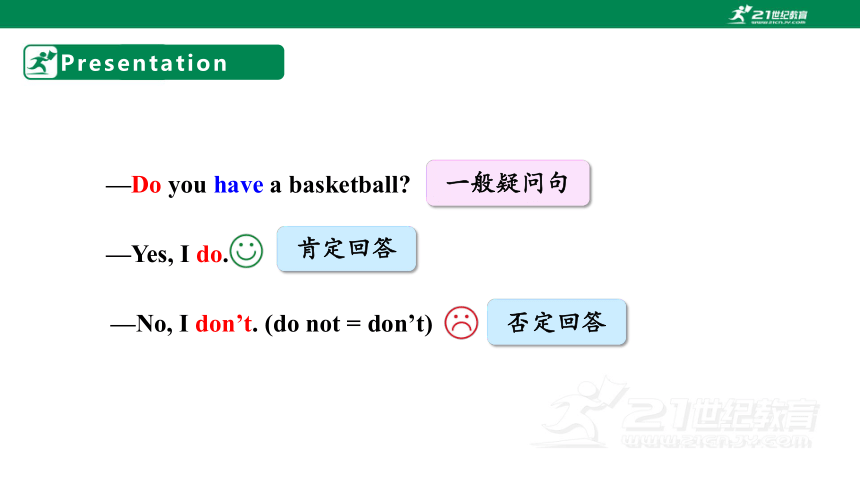
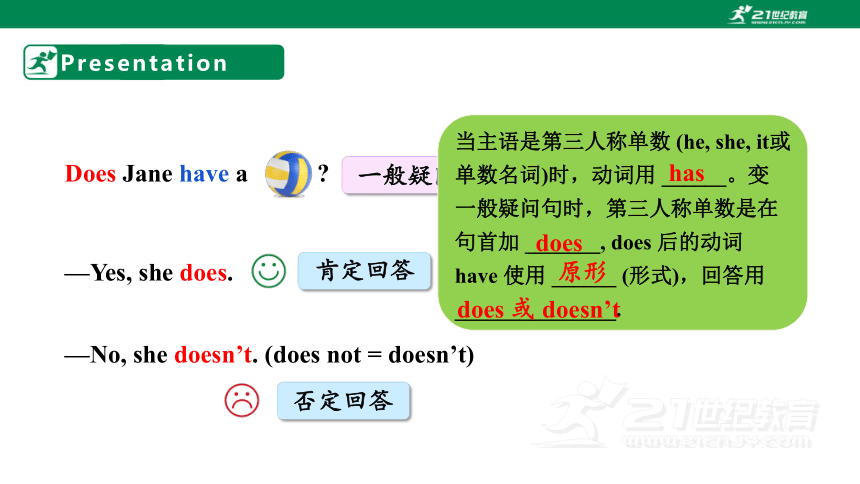
文档简介
(共27张PPT)
0
人教版七年级(初中)英语上册
Unit 5
Do you have a soccer ball
Section A (Grammar Focus-3c)
Learning objectives
0
1)To learn the key words:great; play; sound; do; does
2)To learn the usage of “have” in present tense.
3)To talk about ownership with the key sentence patterns.
Lead in
A: Do you have a volleyball
B: Yes, I do.
A: Let’s play volleyball.
B: Great!
Talk with your partners according to the picture.
Lead in
Cindy
A: Does … have a…?
B: Yes, he / she does. He / She has a/two…
No, he / she doesn’t. He / She doesn’t have a…
Bob
Bob
Bob
Bob
Cindy
Cindy
Presentation
Grammar Focus
Do you have a baseball Yes, I do. / No, I don’t. I have a volleyball.
Do you have a ping-pong bat Yes, I do. / No, I don’t. I have a ping-pong ball.
Does she have a tennis ball Yes, she does. / No, she doesn’t. She has a baseball.
Does he have a soccer ball Yes, he does. / No, he doesn’t. He has two ping-pong bats.
Do they have a basketball Yes, they do. / No, they don’t. They have a volleyball.
don’t=do not doesn’t=does not
Presentation
1. _________ have a basketball ___________. I have a ping-pong ball.
你有一个篮球吗? 不,我没有。我有一个乒乓球。
2. _________ have a football ____________.
他有一个足球吗? 是的,他有。
3. _________ have a volleyball ______________.
她有一个排球吗? 是的,她有。
4. _________ have two baseballs ______________.
他们/她们有两个棒球吗? 不,他们/她们没有。
Do you
No, I don't
Yes, he does
Does he
Yes, she does
Does she
No, they don't
Do they
Complete the sentences.
Presentation
I have a .
Look and learn:
But I don’t have a .
Do you have a basketball
肯定句
否定句
一般疑问句
当主语是第一人称 (I, we),第二人称 (you) 和第三人称复数 (they或其他复数名词等) 时,动词用 _____,变一般疑问句时,第一,二人称和第三人称复数是在句首加 _____, do后的动词 have 使用 ______ (形式),回答用 _____________.
have
do
原形
do 或 don’t
Presentation
—Do you have a basketball
一般疑问句
—Yes, I do.
—No, I don’t. (do not = don’t)
肯定回答
否定回答
Presentation
Does Jane have a
一般疑问句
—Yes, she does.
—No, she doesn’t. (does not = doesn’t)
肯定回答
否定回答
当主语是第三人称单数 (he, she, it或单数名词)时,动词用 ______。变一般疑问句时,第三人称单数是在句首加 _______, does 后的动词 have 使用 ______ (形式),回答用 _______________.
has
does
原形
does 或 doesn’t
Presentation
谓语动词是have的否定句和疑问句要通过助动词 do 或 does 构成。句式结构见下表:
肯定句 主语+have/ has+其他.
否定句 主语+ don’ t/ doesn’t have +其他.
一般疑问句 Do/ Does +主语+have+其他
肯定回答: Yes, 主语+ do/does.
否定回答: No, 主语+don’t/doesn’t.
Presentation
I have a baseball. 我有一个棒球。
They have some Chinese friends.
他们有一些中国朋友。
Tom has a brother.
汤姆有个哥哥。
The house has ten rooms.
这所房子有十个房间。
肯定句: 主语+ have/has …
Presentation
否定句:主语+ don’t / doesn’t + have …
变否定句时,需要借助助动词do或 does 的否定形式。
主语为非第三人称单数时, 句型为:主语+don’t have...
eg:I don’t have a baseball. 我没有棒球。
主语为第三人称单数时, 句型为:主语+doesn’t have...
eg:My sister doesn’t have a watch.
我的妹妹没有手表。
Presentation
变一般疑问句时,也需要借助助动词do及其第三人称单数形式does。
主语为非第三人称单数时,句型为:Do+主语+have...
主语为第三人称单数时,句型为:Does+主语+have...
肯定回答: Yes, 主语+do / does.
否定回答: No, 主语+don’t / doesn’t.
一般疑问句: Do/Does+主语+have…?
Presentation
如:
—Do you have a basketball 你有篮球吗?
— Yes, I do. / No, I don’t.
是的,有。/ 不,没有。
— Does he have a tennis racket 他有一个网球拍吗?
— Yes, he does. / No, he doesn’t.
是的,他有。/ 不,他没有。
Presentation
一、用 have/has 填空。
1. My grandparents _______ two sons and three daughters.
2. —She ______ a volleyball. Let’s play volleyball.
—That sounds great.
3.—Does your English teacher _____ a black bag
—Yes, she does.
4. My father _____ a new volleyball. Let’s play it after school.
5. Laura and Betty _____ four pencils.
have
has
have
has
have
Presentation
二、按要求完成句子,每空一词。
1. I have a yellow notebook. (改为否定句)
I _____ ______ a yellow notebook.
2. Micheal has two soccer balls. (改为一般疑问句)
______ Micheal ______ two soccer balls
don’t have
Does have
Presentation
3. Does your sister have ping-pong bats (作否定回答)
______, she _______.
4. Jane has two computers. (对画线部分提问)
______ ______ Jane ______
5.你的哥哥有排球吗 (汉译英)
_______ your brother ______ a volleyball
No doesn’t
What does have
Does have
Presentation
3a Write each word in the correct place in the chart.
I he they you we she it Eric
do does
I they
you we
he she
it Eric
Presentation
3b Fill in the blanks with do or does. Then practice the conversations with your partner.
A: you have a baseball
B: Yes, I .
A: Great! I have a bat. Let’s play!
Do
do
A: John have a soccer ball
B: No, he .
A: he have a ping-pong bat
B: Yes, he . I think he has a ping-pong ball, too.
A: Hmm… let’s ask.
Does
doesn’t
Does
does
A: your friends have a basketball
B: Yes, they . They have two basketballs.
A: Well, let’s play basketball.
B: That sounds good.
Do
do
Presentation
3c Remember the things in Bob’s room. Then close your books and ask and answer questions with a partner.
A: Does Bob have a soccer ball
B: Yes, he does.
Language points
1. Well, let’s play basketball.
1) play在此处是及物动词,后接表示球类运动的名词时,play 与球类运动名词之间不加冠词, eg: play basketball 打篮球
2) play作动词还可意为 “玩耍”,play with sb./sth.表示“和某人一起玩/玩……”。
3) play作动词,还可意为“演奏;弹奏” ,后接表示乐器的名词时,乐器名词前要加定冠词the, eg: play the piano 弹钢琴
Language points
2. That sounds good.
sound v. “听起来好像”, 既是连系动词, 也是感观动词后常接形容词作表语。
That sounds interesting. 那听起来很有趣。
常见的感观动词:
Exercise
按要求完成下列各题:
1. I have two ping-pong bats. (改为一般疑问句)
____ ____ ____ two ping-pong bats
2. His brother has a soccer ball. (改为否定句)
His brother ________ ______ a soccer ball.
3. Do they like basketball (作否定回答)
_____, they ________.
4. I have a computer. (改为否定句)
I _____ ______ a computer.
Do you have
doesn’t have
No don’t
don’t have
Exercise
5. She has a ping-pong ball. (改为一般疑问句)
_____ she ______ a ping-pong ball
6. Her schoolbag is under the table. (对划线部分提问)
______ ____ her schoolbag
7. Does Helen have a dictionary (作肯定回答)
Yes, _____ _____.
8. Do you have a soccer ball (作否定回答)
No, ____ _______.
Where is
I don’t
she does
Does have
Homework
1. Practice the conversations in 3b with your partner.
2. Finish the exercises in students' books.
谢谢
21世纪教育网(www.21cnjy.com)
中小学教育资源网站
兼职招聘:
https://www.21cnjy.com/recruitment/home/admin
0
人教版七年级(初中)英语上册
Unit 5
Do you have a soccer ball
Section A (Grammar Focus-3c)
Learning objectives
0
1)To learn the key words:great; play; sound; do; does
2)To learn the usage of “have” in present tense.
3)To talk about ownership with the key sentence patterns.
Lead in
A: Do you have a volleyball
B: Yes, I do.
A: Let’s play volleyball.
B: Great!
Talk with your partners according to the picture.
Lead in
Cindy
A: Does … have a…?
B: Yes, he / she does. He / She has a/two…
No, he / she doesn’t. He / She doesn’t have a…
Bob
Bob
Bob
Bob
Cindy
Cindy
Presentation
Grammar Focus
Do you have a baseball Yes, I do. / No, I don’t. I have a volleyball.
Do you have a ping-pong bat Yes, I do. / No, I don’t. I have a ping-pong ball.
Does she have a tennis ball Yes, she does. / No, she doesn’t. She has a baseball.
Does he have a soccer ball Yes, he does. / No, he doesn’t. He has two ping-pong bats.
Do they have a basketball Yes, they do. / No, they don’t. They have a volleyball.
don’t=do not doesn’t=does not
Presentation
1. _________ have a basketball ___________. I have a ping-pong ball.
你有一个篮球吗? 不,我没有。我有一个乒乓球。
2. _________ have a football ____________.
他有一个足球吗? 是的,他有。
3. _________ have a volleyball ______________.
她有一个排球吗? 是的,她有。
4. _________ have two baseballs ______________.
他们/她们有两个棒球吗? 不,他们/她们没有。
Do you
No, I don't
Yes, he does
Does he
Yes, she does
Does she
No, they don't
Do they
Complete the sentences.
Presentation
I have a .
Look and learn:
But I don’t have a .
Do you have a basketball
肯定句
否定句
一般疑问句
当主语是第一人称 (I, we),第二人称 (you) 和第三人称复数 (they或其他复数名词等) 时,动词用 _____,变一般疑问句时,第一,二人称和第三人称复数是在句首加 _____, do后的动词 have 使用 ______ (形式),回答用 _____________.
have
do
原形
do 或 don’t
Presentation
—Do you have a basketball
一般疑问句
—Yes, I do.
—No, I don’t. (do not = don’t)
肯定回答
否定回答
Presentation
Does Jane have a
一般疑问句
—Yes, she does.
—No, she doesn’t. (does not = doesn’t)
肯定回答
否定回答
当主语是第三人称单数 (he, she, it或单数名词)时,动词用 ______。变一般疑问句时,第三人称单数是在句首加 _______, does 后的动词 have 使用 ______ (形式),回答用 _______________.
has
does
原形
does 或 doesn’t
Presentation
谓语动词是have的否定句和疑问句要通过助动词 do 或 does 构成。句式结构见下表:
肯定句 主语+have/ has+其他.
否定句 主语+ don’ t/ doesn’t have +其他.
一般疑问句 Do/ Does +主语+have+其他
肯定回答: Yes, 主语+ do/does.
否定回答: No, 主语+don’t/doesn’t.
Presentation
I have a baseball. 我有一个棒球。
They have some Chinese friends.
他们有一些中国朋友。
Tom has a brother.
汤姆有个哥哥。
The house has ten rooms.
这所房子有十个房间。
肯定句: 主语+ have/has …
Presentation
否定句:主语+ don’t / doesn’t + have …
变否定句时,需要借助助动词do或 does 的否定形式。
主语为非第三人称单数时, 句型为:主语+don’t have...
eg:I don’t have a baseball. 我没有棒球。
主语为第三人称单数时, 句型为:主语+doesn’t have...
eg:My sister doesn’t have a watch.
我的妹妹没有手表。
Presentation
变一般疑问句时,也需要借助助动词do及其第三人称单数形式does。
主语为非第三人称单数时,句型为:Do+主语+have...
主语为第三人称单数时,句型为:Does+主语+have...
肯定回答: Yes, 主语+do / does.
否定回答: No, 主语+don’t / doesn’t.
一般疑问句: Do/Does+主语+have…?
Presentation
如:
—Do you have a basketball 你有篮球吗?
— Yes, I do. / No, I don’t.
是的,有。/ 不,没有。
— Does he have a tennis racket 他有一个网球拍吗?
— Yes, he does. / No, he doesn’t.
是的,他有。/ 不,他没有。
Presentation
一、用 have/has 填空。
1. My grandparents _______ two sons and three daughters.
2. —She ______ a volleyball. Let’s play volleyball.
—That sounds great.
3.—Does your English teacher _____ a black bag
—Yes, she does.
4. My father _____ a new volleyball. Let’s play it after school.
5. Laura and Betty _____ four pencils.
have
has
have
has
have
Presentation
二、按要求完成句子,每空一词。
1. I have a yellow notebook. (改为否定句)
I _____ ______ a yellow notebook.
2. Micheal has two soccer balls. (改为一般疑问句)
______ Micheal ______ two soccer balls
don’t have
Does have
Presentation
3. Does your sister have ping-pong bats (作否定回答)
______, she _______.
4. Jane has two computers. (对画线部分提问)
______ ______ Jane ______
5.你的哥哥有排球吗 (汉译英)
_______ your brother ______ a volleyball
No doesn’t
What does have
Does have
Presentation
3a Write each word in the correct place in the chart.
I he they you we she it Eric
do does
I they
you we
he she
it Eric
Presentation
3b Fill in the blanks with do or does. Then practice the conversations with your partner.
A: you have a baseball
B: Yes, I .
A: Great! I have a bat. Let’s play!
Do
do
A: John have a soccer ball
B: No, he .
A: he have a ping-pong bat
B: Yes, he . I think he has a ping-pong ball, too.
A: Hmm… let’s ask.
Does
doesn’t
Does
does
A: your friends have a basketball
B: Yes, they . They have two basketballs.
A: Well, let’s play basketball.
B: That sounds good.
Do
do
Presentation
3c Remember the things in Bob’s room. Then close your books and ask and answer questions with a partner.
A: Does Bob have a soccer ball
B: Yes, he does.
Language points
1. Well, let’s play basketball.
1) play在此处是及物动词,后接表示球类运动的名词时,play 与球类运动名词之间不加冠词, eg: play basketball 打篮球
2) play作动词还可意为 “玩耍”,play with sb./sth.表示“和某人一起玩/玩……”。
3) play作动词,还可意为“演奏;弹奏” ,后接表示乐器的名词时,乐器名词前要加定冠词the, eg: play the piano 弹钢琴
Language points
2. That sounds good.
sound v. “听起来好像”, 既是连系动词, 也是感观动词后常接形容词作表语。
That sounds interesting. 那听起来很有趣。
常见的感观动词:
Exercise
按要求完成下列各题:
1. I have two ping-pong bats. (改为一般疑问句)
____ ____ ____ two ping-pong bats
2. His brother has a soccer ball. (改为否定句)
His brother ________ ______ a soccer ball.
3. Do they like basketball (作否定回答)
_____, they ________.
4. I have a computer. (改为否定句)
I _____ ______ a computer.
Do you have
doesn’t have
No don’t
don’t have
Exercise
5. She has a ping-pong ball. (改为一般疑问句)
_____ she ______ a ping-pong ball
6. Her schoolbag is under the table. (对划线部分提问)
______ ____ her schoolbag
7. Does Helen have a dictionary (作肯定回答)
Yes, _____ _____.
8. Do you have a soccer ball (作否定回答)
No, ____ _______.
Where is
I don’t
she does
Does have
Homework
1. Practice the conversations in 3b with your partner.
2. Finish the exercises in students' books.
谢谢
21世纪教育网(www.21cnjy.com)
中小学教育资源网站
兼职招聘:
https://www.21cnjy.com/recruitment/home/admin
同课章节目录
- starters 预备篇(2012秋审查)
- Unit 1 Good morning !
- Unit 2 What’s this in English?
- Unit 3 What color is it ?
- Unit 1 My name's Gina.
- Section A
- Section B
- Unit 2 This is my sister.
- Section A
- Section B
- Unit 3 Is this your pencil?
- Section A
- Section B
- Unit 4 Where's my schoolbag?
- Section A
- Section B
- Unit 5 Do you have a soccer ball?
- Section A
- Section B
- Unit 6 Do you like bananas?
- Section A
- Section B
- Unit 7 How much are these socks?
- Section A
- Section B
- Unit 8 When is your birthday?
- Section A
- Section B
- Unit 9 My favorite subject is science.
- Section A
- Section B
